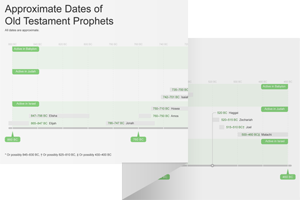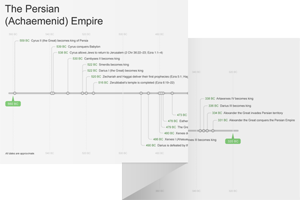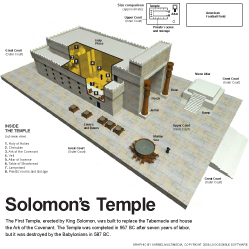1:1–11 The opening verse of Haggai |
1:1 the second year of King Darius Refers to 520 bc. Darius I Hystaspes was ruler of the Persian Empire from 522–486 bc (see note on Ezra 4:5).
from 522–486 bc (see note on Ezra 4:5).
the word of Yahweh A common way for the prophets to identify their messages as coming from Yahweh. Compare Joel 1:1; Mic 1:1; Zeph 1:1.
 Prophetic Commissioning and the Divine Presence
Prophetic Commissioning and the Divine Presence
through This phrase may indicate that Haggai wrote his prophecy.
Haggai Meaning “festival.” This name suggests Haggai may have been born on a religious holiday. The details of his ancestry are missing—a noteworthy omission considering the emphasis on genealogies in texts from after the exile (e.g., 1 Chr 1–9; Ezra 7:1–5; Zech 1:1) and the recording of the fathers’ names (patronyms) of both Zerubbabel and Joshua (1:1). Haggai was a contemporary of Zechariah; the beginning of his ministry preceded that of Zechariah by about two months.
the prophet Haggai appears to have been well known since he is routinely identified simply as “the prophet” (see Ezra 5:1; 6:14; Hag 1:3, 12).
Zerubbabel the son of Shealtiel A leader of the postexilic community. He was appointed governor of the Persian province of Judah (Yehud). See Ezra 2:2 and note.
See Ezra 2:2 and note.
Joshua The first high priest of the remnant who reestablished worship of Yahweh in Jerusalem. See note on Zech 3:1.
1:2 Yahweh of hosts This divine title is used throughout the book of Haggai. It evokes the idea that Yahweh commands heavenly beings, including cherubim and seraphim (compare Josh 5:14). See note on Isa 1:9.
This people This phrase provides a sense of detachment between Haggai and the rest of the community. It indicates that the prophet has a different opinion.
The time has not come to rebuild Initially, those who had returned from exile had started to rebuild the temple (see Ezra 3:1–13). However, the project was halted when the people became fearful of surrounding enemies—foreigners who opposed the efforts of the Jews (see Ezra 4:1–5). By Haggai’s day, work on the temple had been suspended for 16 years.
the temple of Yahweh The temple in Jerusalem.
1:4 your houses that have been paneled Many of the Israelites’ homes had been decorated with ornate paneling. The Hebrew word used here is the same word used in 1 Kgs 6:9 to describe the opulent interior of Solomon’s temple.
this house is desolate The nation’s priorities were misplaced; the people had focused on decorating their homes instead of rebuilding the temple.
1:6 You have sown much Throughout this verse, the prophet emphasizes how the people’s efforts to improve their own lives have proved futile while they have ignored the important task of restoring Yahweh’s house.
1:8 bring wood The famous cedars of Lebanon. Following the example of Solomon (compare 2 Chr 2:16), the people contracted the Phoenicians to bring timber from the region of Lebanon to the port city of Joppa when they began to rebuild the temple (Ezra 3:7).
1:9 are running each to your own house Reinforcing the point from Haggai 1:4. The people were intent on rebuilding their own houses, but they were neglecting the work on Yahweh’s house.
1:11 a drought Prolonged lack of water resulted in drought, which had a significant effect on an agrarian society. It was commonly viewed as divine judgment (compare 1 Kgs 8:35), and Yahweh explicitly takes credit for causing this hardship to punish the people for not diligently working on the temple.
1:12–15 Haggai’s message inspires the correct response: Zerubbabel, Joshua, and the rest of the people restart their work on the temple. The project resumes on the 24th day of the sixth month, several weeks after the oracle of Haggai 1:1–11 (dated to the first day of the sixth month). |
1:13 the messenger of Yahweh Here the Hebrew phrase malakh yhwh refers to the prophet as God’s messenger, but the ot often uses this phrase to refer to the angel of Yahweh (e.g., Gen 22:11; Exod 3:2; Judg 13:3; Zech 1:11). The word denoting “messenger” (malakh) is common for human messengers speaking on behalf of their masters (Gen 32:3, 6; 1 Kgs 20:2; 2 Kgs 19:9), but it is rarely used to refer to the prophets as human messengers speaking for God (Isa 42:19; 44:26; Mal 2:7; 3:1).
(e.g., Gen 22:11; Exod 3:2; Judg 13:3; Zech 1:11). The word denoting “messenger” (malakh) is common for human messengers speaking on behalf of their masters (Gen 32:3, 6; 1 Kgs 20:2; 2 Kgs 19:9), but it is rarely used to refer to the prophets as human messengers speaking for God (Isa 42:19; 44:26; Mal 2:7; 3:1).
I am with you One of the great divine promises in the Bible (compare Matt 28:20). Yahweh gives the same message to Isaac (Gen 26:24), Jacob (Gen 28:15), the Israelites (Isa 41:10; 43:5; Jer 30:11; 46:28), and Jeremiah (Jer 1:8, 19; 15:20). Similar language is also used in Yahweh’s promises to Moses (Exod 3:12), Joshua (Deut 31:23; Josh 1:5; 3:7), and Gideon (Judg 6:16).
1:14 the spirit of The Hebrew term used here is describing people’s volitional will. God gave them the desire and willingness to work on the temple.
the house of Yahweh of hosts The community would continue to work on the temple for the next five years, finally completing the project on the third day of Adar (the 12th month, roughly February—March) in the sixth year of Darius (March 12, 515 bc in the modern calendar; compare Ezra 6:15).

|
About Faithlife Study BibleFaithlife Study Bible (FSB) is your guide to the ancient world of the Old and New Testaments, with study notes and articles that draw from a wide range of academic research. FSB helps you learn how to think about interpretation methods and issues so that you can gain a deeper understanding of the text. |
| Copyright |
Copyright 2012 Logos Bible Software. |
| Support Info | fsb |
 Loading…
Loading…



